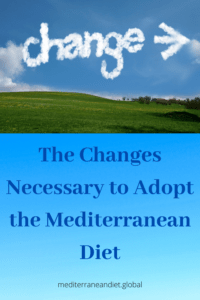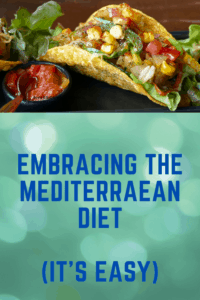
Change Strategy
The process of effectively making changes is not taught in school, and unless you ended up with a parent with that skill and the resolve to teach it is likely you never received formal training on how to change. If you have not yet developed this skill this article discusses some of the basics of creating lasting change as it applies to the Mediterranean food diet, intermittent fasting, eliminating belly fat, losing weight, and staying healthy.
Motivation
The top drivers for people joining our Mediterranean Diet group include: doctors’ orders, high blood pressure, high cholesterol, scary health conditions, worsening health condition, want to look great, want to feel great, spouse or family pressure, and preparing for an upcoming event. Mediterranean Diet reviews have concluded that improving all of these things are possible with the Mediterranean Diet. In order to get started and change effectively for long term success, you will likely need to leave your comfort zone
Methods
Now that you have decided to embrace the Mediterranean food diet it is time to make this change stick for good. Most of us benefit from support and guidance through transformation unless we are already adept at change. We know that saying and doing are two different things, making this change is an active enterprise, sitting back and being passive will not suffice. While some may find tossing out all non-Mediterranean Diet food is the best way to start the either /or mentality will make it difficult to recover from failing. Studies show that habits usually take weeks or more to firmly establish and will be particularly challenging between 3 days and 10 days after starting. Know that there will be resistance from your body as the drive to return to the familiar is overwhelming, even if the familiar is killing you. Making changes slowly may mean you won’t see results quickly enough to give you incentive to continue. Stick with whatever style will work best for you and your family if they are joining you.

Moral Licensing
Moral licensing is one identified behavior that affects most of us. Knowing that we have limited will power, it also helps to recognize this behavior when it happens so you can nip it in the bud. I recently hiked for three hours on a holiday known for overeating. In the past I would give myself permission to overeat and top it off with dessert. Recognizing this I was able to eat slowly, and just enough to feel satiated, then saved the dessert for another day. The net gain was considerable in terms of health and well-being, no bloated too full feeling, just good exercise and just the right amount of Mediterranean Diet food. The impetus to offset sacrifice with food or sedentary rewards is easy to overcome once you recognize it and defeat peer pressure. The body’s demand for the rewards is based on what the body expects to feel, the comfort of salt, sugar, or fat. Even being aware of this habit, I continue to catch myself falling prey to the allure of having those substances as a reward. Recognizing and dealing effectively with moral licensing is a very good step in the direction of adopting the best Mediterranean Diet for you.
A risk with Intermittent Fasting is that at first skipping a meal regularly may seem quite extreme, and the habit of moral obligation may present itself. It may going something like this, I skipped my evening meal and haven’t eaten since noon, I don’t think a little piece of cake would hurt. Or I have been good for three days but feel thirsty; a glass of sweet tea won’t have too many calories. With Intermittent Fasting any other substance and in particular sugar is going to break the fast, so those adopting IF have to be particularly vigilant.
Willpower
Self-help experts agree that willpower is a finite resource. We need willpower daily to get tasks done but it is energy that is consumed each time we use it. Know that even when we focus our energy and attempt to conserve willpower it will not be enough to alone is not enough to effectively make big changes like fully adopting the best Mediterranean Diet. The next step then is effective habit creation, which reduces the need to use limited willpower over time. A new habit transforms challenging new behaviors into easily achievable behaviors doable things by automating them and making them independent of our will power/ The remaining will power can then be used for other things. In addition the success of adapting without the “force of will” will add to will power reserves.

Progressive Extremism
Another effective way to conserve willpower while effectively adopting the Mediterranean Way of Eating is to change your mindset and identify as that person you want to be. That person won’t swing by the fast food place for fries on the way home, just saying to him or herself I am not someone who does that, or I make healthy choices and the results are plenty enough reward.
With the trajectory of change this will be easy to do on day one and two, more difficult during the following week then easier and easier as the habit is fully adopted. There is a multiplier effect here as eliminating unwanted habits reduces the demand on willpower and gives you the incentive that continually fulfilling commitments brings. With progressive extremism eliminate the first big thing, then move on to the next then the next. A useful way to think of it when asked the question, do you eat meat then the answer goes from I am depriving myself “and I can’t” previously to the new “I am not someone who does that as I now make healthier choices.” The tactic of progressive extremism works very well once you become accustomed to using it.
A perfect example of Progressive Extremism is the path to Intermittent Fasting (IF). The common first steps are to decide on and create a fasting window which means no food or drink other than water or unsweetened coffee or tea during a specific amount of time each day. There are multiple variations to this practice however, time of day, number of hours each day or possible 5:3 where one eats normally for five days then fasts for two. So many of us experimented, trying out various IF methods before settling on one that worked best. While experimenting we found that our stomachs shrunk and we started seeing immediate results, there was gratification and satisfaction to our purposeful Way of Eating. Once adopted it is now much harder to return to our former habits, and as it turns out readopting Intermittent Fasting in much easier than working through the initial discomfort.

Behavioral Economics
Behavioral economics is a newer discipline that identifies common human behavior and provides processes that make it simple to make the right choice. Most people reading this article will be changing from their current WOE and lifestyle and like moral licensing recognizing the triggers can ensure the change I more effective. A well-known example of behavioral economics as it pertains to the Mediterranean Diet is placing fruit prominently at the entrance of the school cafeteria and chips and other unhealthy snacks near the end of the line. The results of this arrangement are amazing, and this tactic is something you can easily do for yourself. Stop for a moment and think of a few ways you can load better choices so they are the also the easiest to take. This would mean keeping cold water in the fridge, tossing out temptations like cake, having fruit on hand, or eliminating a cup of sweet coffee or tea in the morning.
Get curious
A fourth strategy for changing habits is the mindfulness skills of curiosity and focus. Knowing that some habit or craving was formed for a reason that may very well no longer be valid allows you to reset to act in your own best interest. The key here is awareness and stopping yourself to consider before eating. You might act questions such as “Is this on the Mediterranean Diet? Identify the prompt that encourages the habit that you are breaking when embrace in this WOE. Whether it’s convenience, costs, sugar craving, low blood sugar, weariness or other, get curious about what would happen if you thought about the craving instead of acting on it. Use that moment to prepare and eat a healthy Mediterranean meal. Having the goal in mind and knowing that it takes only a matter of weeks to change your WOE for the better will help with the transition. Intermittent Fasting also trains you to check into whether or not you are actually hungry, or just feel like eating. This distinction is another key to successful transitions.
Knowing our behaviors and habits allows us to control them by using the three techniques of stopping moral licensing, implementing progressive extremism, and setting yourself up for success with behavioral economics. The outcome of choosing healthier outcomes will build on itself making it easier and easier over time to improve your diet and your life. Resisting the gravity of stale habits and effectively replacing them with new healthier desirable habits is the goal.
Intermittent Fasting can actually make this transition easier as the results are typically very quick and there is little room for ambiguity or gray area, one is either fasting for a specific period of time each day or not. Having set meal times and meal portions is a great strategy to minimize temptation and help you reach your weight goals quickly and easily.
To your Health!
